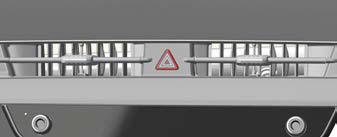Kia Sportage: Road warning
When an emergency situation occurs while driving or when you park by the edge of the roadway, you must alert approaching or passing vehicles to be careful as they pass. For this, you should use the hazard warning flasher.
Hazard warning flasher
The hazard warning flasher serves as a warning to other drivers to exercise extreme caution when approaching, overtaking, or passing your vehicle.

It should be used whenever emergency repairs are being made or when the vehicle is stopped near the edge of a roadway.
Depress the flasher switch with the ENGINE START/STOP button in any position. The flasher switch is located in the center fascia panel. All turn signal lights will flash simultaneously.
- The hazard warning flasher operates whether your vehicle is running or not.
- The turn signals do not work when the hazard flasher is on.
- Care must be taken when using the hazard warning flasher while the vehicle is being towed.
In case of an emergency while driving
If an emergency situation occurs while driving, stay calm and take the following steps.
If the vehicle stalls while driving
- Reduce your speed gradually, keeping a straight line.
- Move cautiously off the road to a safe place.
- Turn on your hazard warning flasher.
- Try to start the vehicle again. If your vehicle will not start, contact an authorized Kia dealer or seek other qualified assistance.
If the engine stalls at a crossroad or crossing
- If the engine stalls at a crossroad or crossing, set the shift lever in the N (Neutral) position and then push the vehicle to a safe place.
If you have a flat tire while driving
- Take your foot off the accelerator
pedal and let the vehicle slow down
while driving straight ahead.
Do not apply the brakes immediately or attempt to pull off the road as this may cause a loss of control.
- When the vehicle has slowed to such a speed that it is safe to do so, brake carefully and pull off the road.
- Drive off the road as far as possible
and park on firm level ground.
If you are on a divided highway, do not park in the median area between the two traffic lanes.
- When the vehicle is stopped, turn on your emergency hazard flashers, set the parking brake and put the transmission in P.
- Have all passengers get out of the vehicle. Be sure they all get out on the side of the vehicle that is away from traffic.
- When changing a flat tire, follow the instruction provided later in this section.
If the engine will not start
When the engine doesn't start, first check to see how much fuel there is and whether the battery is discharged.
If engine doesn't turn over or turns over slowly
- Be sure the shift lever is in N (Neutral) or P (Park) and the emergency brake is set.
- Check the battery connections to be sure they are clean and tight.
- Turn on the interior light. If the light dims or goes out when you operate the starter, the battery is discharged.
- Check the starter connections to be sure they are securely tightened.
WARNING
Do not push or pull the vehicle to start it.
This could cause damage to your vehicle.
Refer to "Jump-starting"
If engine turns over normally but does not start
- Check the fuel level and add fuel if necessary.
- With the ENGINE START/STOP button in the OFF position, check all connectors at the ignition coils and spark plugs. Reconnect any that may be disconnected or loose.
- Check the fuel line in the engine compartment.
- If the engine still does not start, call an authorized Kia dealer or seek other qualified assistance.
READ NEXT:
 Emergency starting
Emergency starting
When the vehicle will not start because
of low battery power, you may need to
jump start the vehicle.
Jump-starting
Connect cables in numerical order and
disconnect in reverse order.
Jump-st
 If the engine overheats
If the engine overheats
If your temperature gauge indicates
overheating, you experience a loss of
power, or hear a loud pinging or knocking,
the engine will probably be too hot.
If this happens, you should:
Pull of
SEE MORE:
 LCD display messages
LCD display messages
Door, hood, liftgate, sunroof open
A, B: Door, hood, liftgate, sunroof open
This warning is displayed indicating
which door, the hood, the liftgate or
the sunroof is open.
Low pressure warning display
A: Low tire pressure
This warning message is displayed if the
tire pressure
 Console
Console
Components and Components Location
Components
[M/T]
Floor console assembly
Floor console tray
Console upper cover [5 speed M/T]
Console upper cover [6 speed M/T]
Console storage box mat
Console side cover [LH]
Console side cover [RH]
Console rear mounting bracket
[Ð
Content
- Home
- Kia Sportage - Fifth generation (NQ5) - (2022-2026) - Owner's Manual
- Kia Sportage - Second generation (JEKM) (2005-2015) - Body Workshop Manual
- Kia Sportage Third generation (SL) - (2011-2016) - Service and Repair Manual
- Sitemap
- Top articles